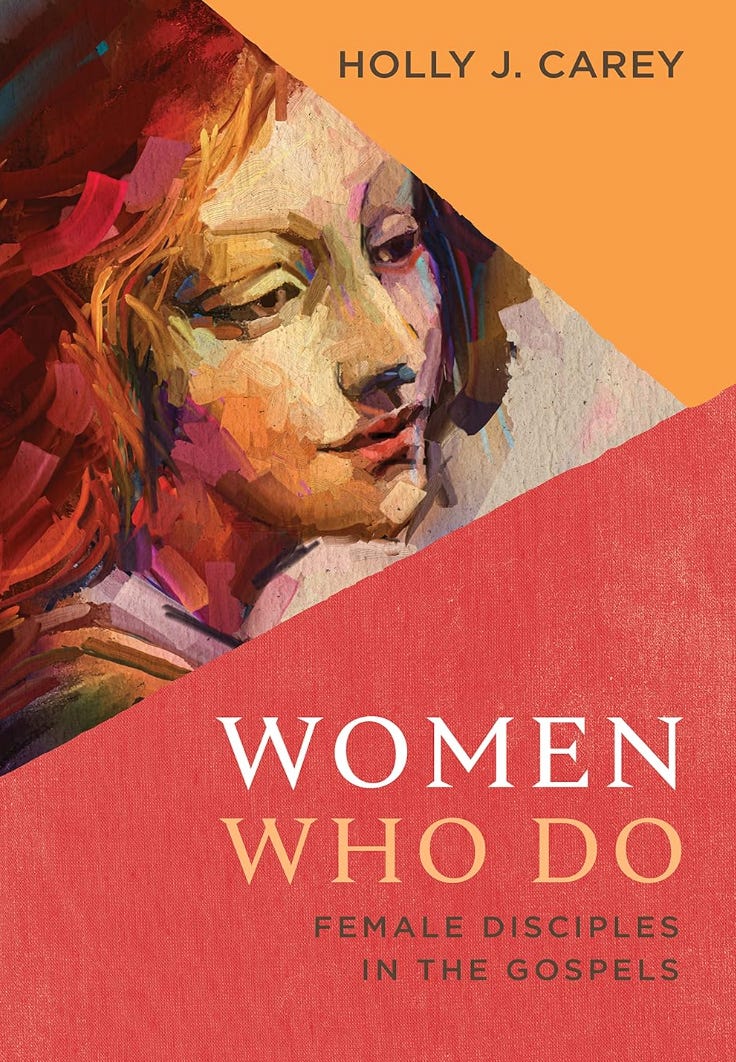Here is a compliment for the new book by Holly Carey. It reminds me of the work of Jack Dean Kingsbury who took the SBL Matthew group by storm with his literary-critical, post-redaction criticism approach to Matthew. His approach was to work through what Matthew actually wrote and how what Matthew wrote framed Christology, kingdom, and discipleship. And he made a contribution to how many (and still do) understand the structure of Matthew. His major book, still very much worth your reading, was entitled Matthew: Structure, Christology, Kingdom.
Holly Carey does for what women in all four Gospels, plus Acts of the Apostles, what Kingsbury did for select themes in Matthew. Her approach is narrative- and literary-critical, it is inductive, and she works her way through the narratives with insight and clarity. The book will be an excellent supplemental textbook for Gospels classes, for women ministries classes, and for (serious) adult Bible classes. It illustrates a method as she presents her case for each Evangelist.
So today I want to offer a summary approach to Holly Carey Women Who Do: Female Disciples in the Gospels (Eerdmans, 2023).
Carey is right: most scholarship has asked “Are there women disciples un the Gospels?” by examining if any women are called “disciple” in the Gospels. This is a mistake of method. Rather than ask if any women are named disciple, and disciple is a near-equivalent of the Twelve in the Gospels, we need to ask what Jesus wanted of those who were his followers. Then we ask “Do women do in the Gospels expect to be done by those Jesus calls to follow him?” The answer for Carey is an unequivocal Yes.
Furthermore, we need to break away from the almost membership-club approach to this question. At times one wonders if there were “official” followers of Jesus. There were not. There were concentric circles around Jesus. Some were with him all the time (the Twelve), some were not (disciples, followers), and there was more than an abundant supply of crowds and onlookers and bystanders and observers. Who’s a disciple when this becomes the picture? We might ask better, as Carey does, Who’s doing what Jesus wants done?
Over and over in the Gospels women do what what Jesus wants done. The Gospel writers, and this is what makes Carey so like Kingsbury, each display their own sketch of women – with little suggestive nuances at times, with significant differences at times – but always Carey keeps us tuned in to the narrative of each Evangelist.
Mark emphasizes women serving, pursuing Jesus and the kingdom, and displaying a sacrificial other-shaped discipleship.
Matthew opens with women in the genealogy that shapes readers to listen for the stories of surprising, active women. She nuances other passages that have parallels, with women commissioned to be the first preachers of the resurrection.
Luke-Acts opens with stories of women: Elizabeth, Mary, Anna. When others are doubting, the women don’t. Women funded Jesus’s kingdom work. Women are right in the middle of things before and during Pentecost. Women are named, like Rhoda and Tabitha.
John’s women move from misunderstanding to understanding as the Gospel’s narrative moves forward.
Overall, then, “Jesus’s teaching on discipleship are embodied in these women: they serve, sacrifice, demonstrate genuine faith, and are willing to risk their lives for the sake of the gospel. They are women who do, and that is something worth recognizing and emulating.”
A notable feature drawn out by Carey’s important new book is that when these women are doing what Jesus wants male disciples in context are not. They are fumbling, failing, and flopping while these women, hardly noticed by some readers, are doing precisely what the men are not doing.






When it’s framed this way, it’s very reminiscent of how people talk about the “upside-down kingdom,” where the kingdom of God looks the opposite of what we expect. We expect strong males leading and being in charge, so we read the gospels that way. But all the while it is the women who are living real kingdom-focused lives.
Dr. Carey was a classmate of mine at Point. We are now colleagues there. Solid book.